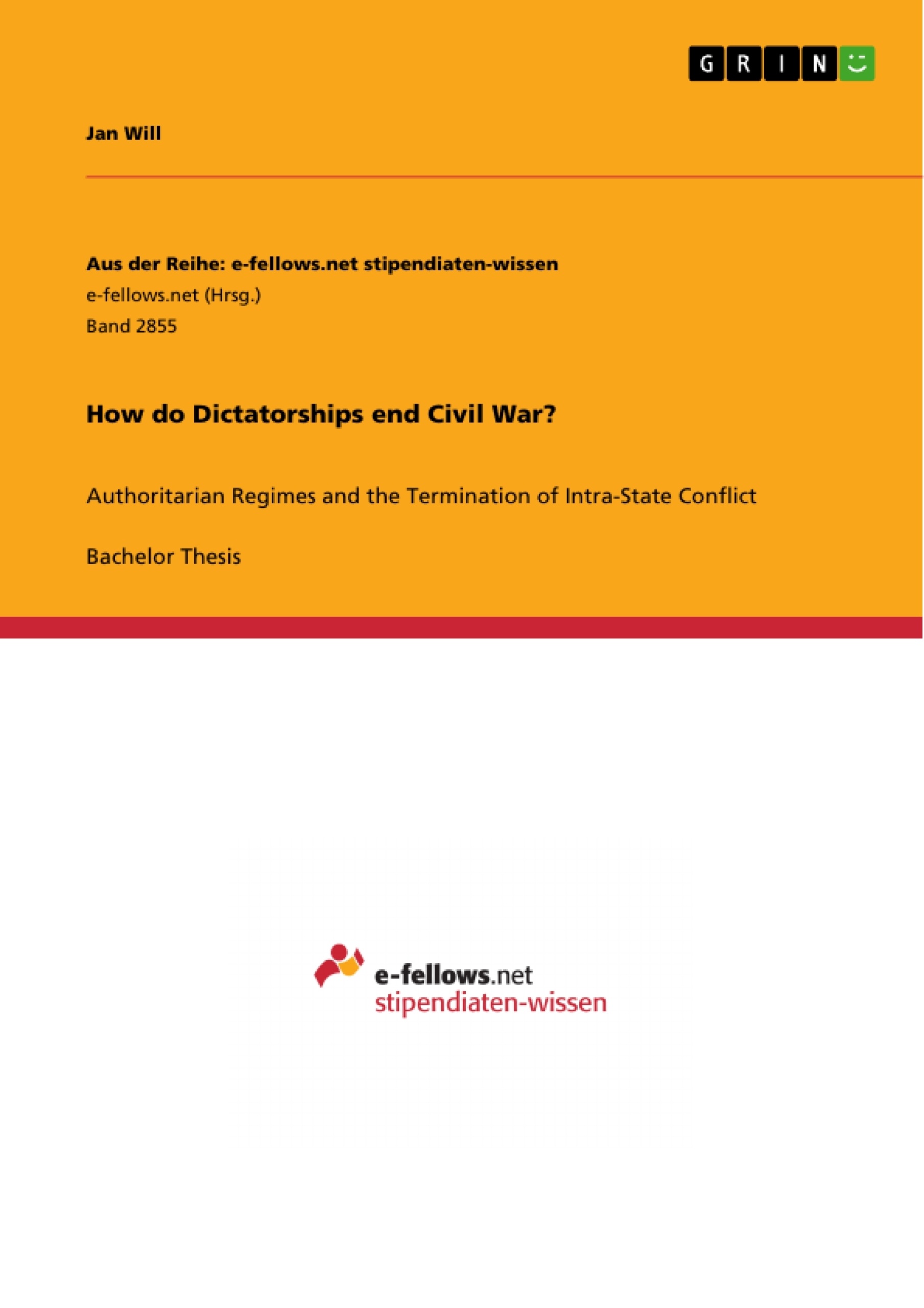This study investigates whether there is a significant impact of different authoritarian regimes, namely personalist and nonpersonalist civilian autocracies as well as their respective military counterparts, on the termination of civil war. The paper suggests that in civil wars those regimes that function on a civilian basis have an advantage in co-opting their opponents to reach a settlement of the conflict. Furthermore, military leaders are expected to be less reluctant towards the use of force than civilian ones which should make them more likely to win civil wars. The same applies to personalist dictators who are hypothesised to view the state as their own and are inclined to forcefully defend their achievements. Several multinomial logit models are tested for the time period between 1946 and 2010. The average predicted probabilities show that personalist civilian regimes indeed are more likely to reach a settlement than other types. Nonpersonalist civilian dictatorships are correctly hypothesised to least likely win an intra-state war, whereas personalist military leaders do so with a comparatively high probability.
Inhaltsverzeichnis (Table of Contents)
- Abstract
- 1. Introduction
- 2. Previous Literature
- 3. How Regimes impact Conflict Termination
- 3.1 Nonpersonalist Civilian Regime
- 3.2 Personalist Civilian Regime
- 3.3 Personalist Military Regime
- 3.4 Nonpersonalist Military Regime
- 4. Data and Research Design
- 4.1 Dependent Variable
- 4.2 Independent Variable
- 4.3 Control Variables
- 4.4 Model
- 5. Results
- 6. Discussion and Conclusion
- References
- List of Figures
- List of Tables
- Variable Coding
- Appendix
- A. Regime Types
- B. Manually changed Regime Types
Zielsetzung und Themenschwerpunkte (Objectives and Key Themes)
This study aims to examine the influence of different authoritarian regimes on the termination of civil war. Specifically, it investigates whether personalist and nonpersonalist civilian autocracies, as well as their military counterparts, have varying impacts on the outcomes of intra-state conflicts. The paper suggests that civilian regimes may have an advantage in co-opting opponents to reach settlements, while military leaders are hypothesized to be more inclined towards the use of force. Personalist dictators, who view the state as their own, are expected to be more assertive in defending their achievements. The study utilizes multinomial logit models and average predicted probabilities to analyze data from the Uppsala Conflict Data Program (UCDP) and the dataset by Geddes, Wright, and Frantz (2014).
- The impact of different authoritarian regime types on civil war termination.
- The role of civilian versus military leadership in conflict resolution.
- The influence of personalist versus nonpersonalist dictatorships on conflict outcomes.
- The use of multinomial logit models and average predicted probabilities to analyze data.
- The comparison of different regime types in terms of their likelihood to achieve a settlement, win, or lose a civil war.
Zusammenfassung der Kapitel (Chapter Summaries)
- Introduction: The paper introduces the topic of civil war termination and explores the question of whether certain types of dictatorships are more likely to produce specific outcomes in intra-state conflicts. It highlights the need to differentiate between authoritarian regimes, as opposed to viewing them as a homogenous group, and introduces the study's framework for investigating the influence of regime type.
- Previous Literature: This chapter reviews existing literature on civil war termination, emphasizing the common observation that conflicts rarely end in decisive victories. It discusses how recent research has started to differentiate between authoritarian regimes in other areas, but the impact of regime type on conflict termination remains largely unexplored.
- How Regimes impact Conflict Termination: This section delves into the theoretical argument, proposing that civilian regimes may have an advantage in co-opting opponents to reach settlements, while military leaders are more likely to resort to force. The study also hypothesizes that personalist dictators are more likely to view the state as their own and therefore more willing to use force to defend their achievements.
- Data and Research Design: This chapter outlines the data sources and research design used in the study. It describes the dependent variable (conflict termination outcomes), the independent variable (regime type), control variables, and the multinomial logit model employed for analysis.
Schlüsselwörter (Keywords)
The primary focus of this study is the impact of different authoritarian regimes on civil war termination. Key concepts include personalist and nonpersonalist dictatorships, civilian and military regimes, conflict outcomes (settlement, government win, rebel win), multinomial logit models, and average predicted probabilities. The study draws upon data from the Uppsala Conflict Data Program (UCDP) and the dataset by Geddes, Wright, and Frantz (2014).¹
- Quote paper
- Jan Will (Author), 2018, How do Dictatorships end Civil War?, Munich, GRIN Verlag, https://www.grin.com/document/445066




